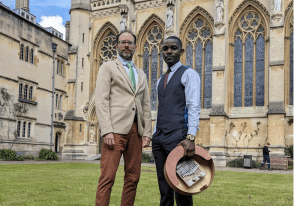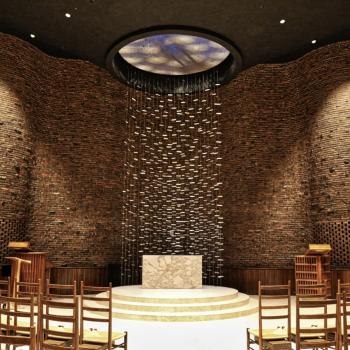In June, I performed a unique sacred music concert in collaboration with the extraordinary Zimbabwean musician John Pfumojena (AKA John Falsetto):
Found in Translation: Cross-Cultural Musical Explorations of the Bible.
Fusing African and Western musical styles, the concert featured one-of-a-kind arrangements for voice, mbira, and piano of gospel songs, African-American spirituals, and hymns.
(For a taste, check out this unique version of Blessed Be the Ties That Bind or this arrangement of the beloved hymn Come Thou Fount of Every Blessing. Or scroll down for the video of the complete concert.)
The concert celebrated the unique power of sacred music to foster Christian unity – while simultaneously challenging us to consider the ways the church has fallen short of its ideals. How? Read more below.
A Personal Collaboration
John and I met for the first time in February while we were both Visiting Fellows at Exeter College, Oxford. In many ways, we are very different musicians. But one thing links us: the breadth of our musical experiences and our embrace of a wide variety of musical styles.
John grew up in Zimbabwe, studying western classical music as well the mbira. (You can learn more about the music of Zimbabwe here.) Now he works as an instrumentalist, singer, actor, and musical theatre artist. I grew up in New England, and I am a classical composer and conductor as a well as scholar and performer works in various popular music traditions.

One night at dinner, John and I discovered something else that we had in common: our shared love for church music. Though we were raised in very different kinds of churches, very far away from each other, it was amazing to see how much of the same music we knew and loved – especially classic hymns, spirituals, and gospel music.
The Complex Legacies of Church Music…and the Bible
As we talked about our experiences with church music, however, one theme began to emerge: the fact that the church has not always been so welcoming to such a wide variety of music. For much of its history, various instruments and musical styles have been deemed inappropriate for use in worship. Whether it’s by prohibiting the pipe organ, the electric guitar, or the mbira, for centuries, the church has used sacred music to enforce differences and draw boundaries between and among worshippers – and, of course, to cement its cultural power.
The same is, of course, true for the Bible. While it has given comfort, hope, joy, and peace to many, it has also been twisted, ignored, and willfully misinterpreted in order to support the ideologies of those in power. Bible verses have been wielded like a hammer – or a lash – in order to justify slavery, racism, colonialism, and a host of other sins. And it’s not just the Bible’s words: it’s also the language in which those words have been rendered. History is full of examples of how institutions have promoted or repressed various translations of the Bible in order to develop and maintain their political and theological authority.
A Unique Musical Concept
As John and I talked about these issues, we came up an idea: what if we created a concert that explored the twin, complex legacies surrounding the use of sacred music and Biblical texts?
To develop this concert, we first put together a list of our favorite pieces of church music:
Wayfaring Stranger, Abide With Me/Iwe Nesu, Come Thou Fount of Every Blessing, Were You There?, I Want Jesus to Walk With Me, Blessed Be the Ties That Bind, Take My Hand, Precious Lord.
Then for each, we came up with an original arrangement drawing upon our individual musical and cultural backgrounds. Our approach to creating these arrangements was collaborative, and the performances were as well. Though we knew in advance the overall structure and feel of each song, all the music we performed was improvised.
In addition to various musical styles, the concert also featured multiple languages: song lyrics and Bible readings in Shona, Ndebele, and English.
Questions and Provocations
The result was a concert that challenged listeners to consider how the various musical styles and spoken languages impacted the way they experienced the messages of the readings and of the songs. Overall, our goal was to explore the complex ways sacred music has been used to both foster unity and to create division: to serve as a means of liberation as well as oppression.
To watch this extraordinary concert, click here.
If you are moved by this performance, we ask that you take a moment to reflect on the worship music in your own church. Is it a source of freedom or of division? Of inclusion or exclusion? Does it reflect the complex history of sacred music in the church – and its connections to racism and colonialism? Or does it ignore it? Ultimately, does the music of your church serve as a source of liberation – or of oppression?
For full information about this concert, visit the Deus Ex Musica website.













